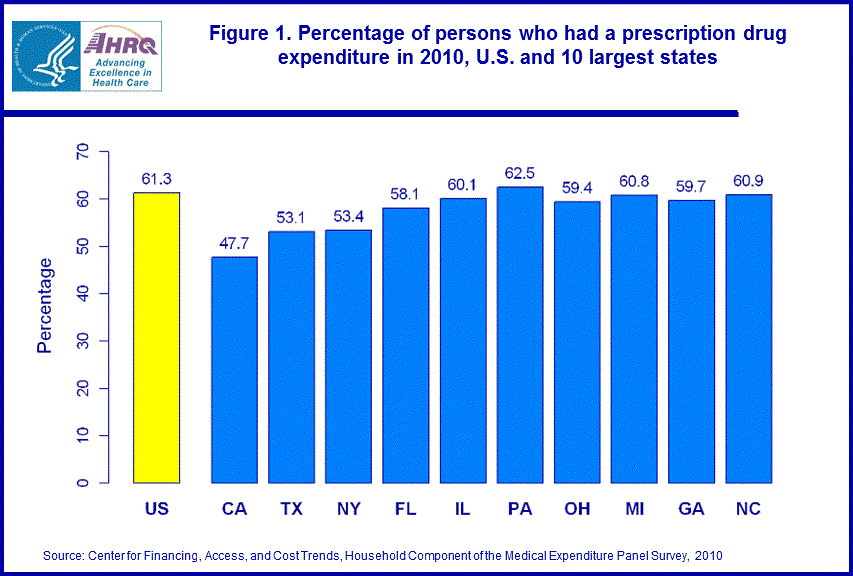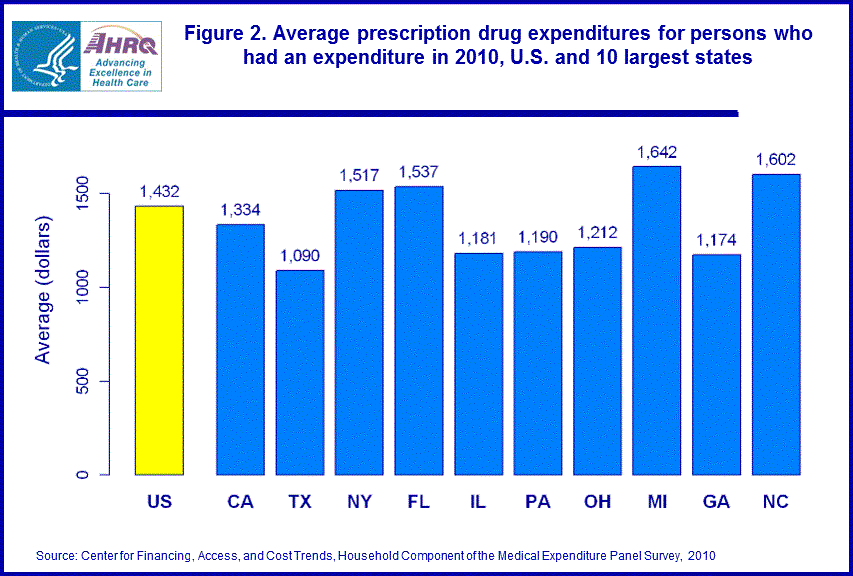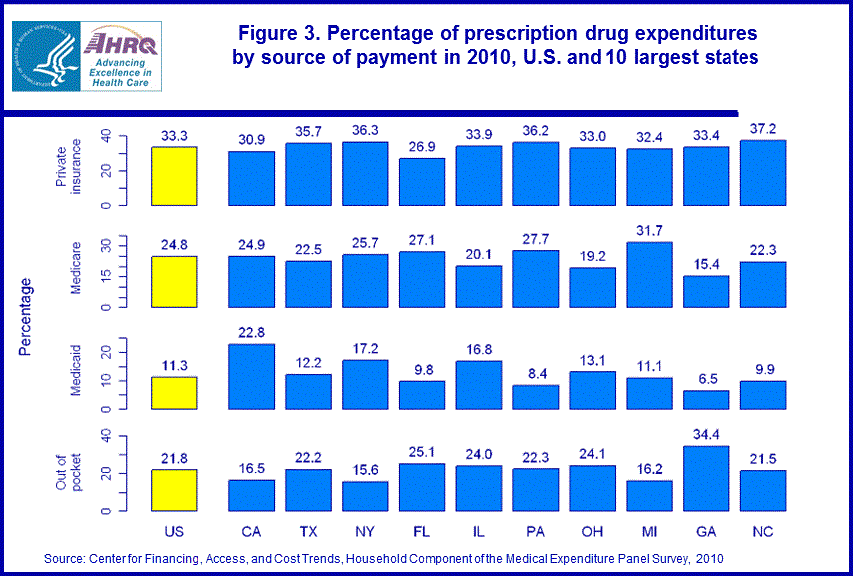
|
|
Font Size:
|
||||
|
|
|
|
||||
STATISTICAL BRIEF #413:
Prescription Drug Expenditures in the 10 Largest States, 2010
Highlights
- In 2010, prescription drugs represented 21.4 percent of all medical expenditures.
- Compared to the national average, the percentage of people with prescription drug expenses was lower in California, Texas, New York, and Florida.
- Among people with prescription drug expenses, the average annual amount in 2010 was lower in Texas compared to the national average.
- In 2010, the percentage of drug expenses paid by private insurance in these 10 states was similar to that for the U.S. as a whole; however, the percentage paid by Medicare and by Medicaid was lower in Georgia, and the percentage paid out of pocket was lower in California, New York, and Michigan.
Introduction
In 2010, prescription drugs accounted for 21.4 percent of overall health care expenditures among the U.S. civilian noninstitutionalized population. Prescription drug expenses were incurred by 61.3 percent of the population, and among those with expenses, the average annual expense amount was $1,432.Prescription drug expenditures are distinguished from overall health care expenditures in the distribution by sources of payment. A higher percentage of prescription drug expenses was paid out of pocket (21.8 percent for drugs versus 14.2 percent overall) and a lower percentage was paid by private insurance (33.3 percent versus 40.1 percent) in 2010. Prescription drug and overall expenses have similar percentages paid by Medicare (24.8 percent versus 25.7 percent) and Medicaid (11.3 percent versus 10.4 percent) in 2010 (data in overall category not shown).
Many factors can influence health care expenses in a particular state, including the demographic, socioeconomic, and health status characteristics of the population. Further, the prevalence and types of health insurance coverage in a state can impact access to care, the level of expenditures, and the extent to which different sources finance health care services.
This Statistical Brief presents estimates based on data from the Household Component of the Medical Expenditure Panel Survey (MEPS-HC) on the use, expenditures, and sources of payments for prescription drug expenditures for persons in the U.S. civilian noninstitutionalized population in 2010 for the 10 largest states, and compares the results to the national average in 2010. Only those estimates with statistically significant differences from the national average using a multiple comparison procedure at the .05 significance level are noted in the text.
Findings
In 2010, 61.3 percent of the U.S. civilian noninstitutionalized population had expenditures for prescription drugs (figure 1). This was lower in California (47.7 percent), Texas (53.1 percent), New York (53.4 percent), and Florida (58.1 percent).Among persons with prescription drug expenses in the U.S. in 2010, the average expenditure per person was $1,432 (figure 2). This amount was lower in Texas ($1,090).
Nationally, 33.3 percent of prescription drug expenditures were paid by private insurance in 2010 (figure 3). The percentages in these 10 states were not statistically different.
In 2010, Medicare and Medicaid paid for 24.8 and 11.3 percent, respectively, of prescription drug expenses in the U.S. (figure 3). The percentages paid by these sources were lower in Georgia (15.4 percent Medicare, 6.5 percent Medicaid).
In the U.S., 21.8 percent of prescription drug expenses were paid out of pocket in 2010 (figure 3). The percentage paid out of pocket was lower than the U.S. average in California (16.5 percent), New York (15.6 percent), and Michigan (16.2 percent).
Data Source
The estimates shown in this Statistical Brief are drawn from analyses conducted by MEPS staff using expenditure data from the following public use file: 2010 Full Year Consolidated File, HC-138.Definitions
ExpendituresExpenditures include total payments from all sources to hospitals, physicians, other health care providers (including dental care and home health), pharmacies, and providers of other medical equipment for services reported by respondents in the MEPS-HC. Sources include direct payments from individuals, private insurance (including TRICARE), Medicare, Medicaid, and various other sources (including the Department of Veterans Affairs, Workers' Compensation, and miscellaneous public sources).
Prescription medicine expenditures
This subcategory of expenditures includes those for all prescribed medications initially purchased or otherwise obtained during the year, as well as any refills.
About MEPS-HC
MEPS-HC is a nationally representative longitudinal survey that collects detailed information on health care utilization and expenditures, health insurance, and health status, as well as a wide variety of social, demographic, and economic characteristics for the U.S. civilian noninstitutionalized population. It is cosponsored by the Agency for Healthcare Research and Quality and the National Center for Health Statistics.For more information about MEPS, call the MEPS information coordinator at AHRQ (301-427-1406) or visit the MEPS Web site at http://www.meps.ahrq.gov.
References
For a detailed description of the MEPS-HC survey design, sample design, and methods used to minimize sources of nonsampling error, see the following publications:Cohen, J. Design and Methods of the Medical Expenditure Panel Survey Household Component. MEPS Methodology Report No. 1. AHCPR Pub. No 97-0026. Rockville, MD. Agency for Health Care Policy and Research, 1997. http://meps.ahrq.gov/mepsweb/data_files/publications/mr1/mr1.shtml
Cohen, S. Sample Design of the 1996 Medical Expenditure Panel Survey Household Component. MEPS Methodology Report No. 2. AHCPR Pub. No. 97-0027. Rockville, MD. Agency for Health Care Policy and Research, 1997. http://meps.ahrq.gov/mepsweb/data_files/publications/mr2/mr2.shtml
Cohen, S. Design Strategies and Innovations in the Medical Expenditure Panel Survey. Medical Care, July 2003: 41(7) Supplement: III-5–III-12.
Sommers, J.P. Producing State Estimates with the Medical Expenditure Panel Survey-Household Component. Agency for Healthcare Research and Quality Working Paper No. 05011, March 2005.
Ezzati-Rice, T.M., Rohde, F., Greenblatt, J. Sample Design of the Medical Expenditure Panel Survey Household Component, 1998–2010. Methodology Report No. 22. March 2010. Agency for Healthcare Research and Quality, Rockville, MD. http://www.meps.ahrq.gov/mepsweb/data_files/publications/mr22/mr22.shtml
Suggested Citation
Rohde, F. Prescription Drug Expenditures in the 10 Largest States, 2010. Statistical Brief #413. June 2013. Agency for Healthcare Research and Quality, Rockville, MD. http://www.meps.ahrq.gov/mepsweb/data_files/publications/st413/stat413.shtmlAHRQ welcomes questions and comments from readers of this publication who are interested in obtaining more information about access, costs, use, financing, and quality of health care in the United States. We also invite you to tell us how you are using this Statistical Brief and other MEPS data and tools and to share suggestions on how MEPS products might be enhanced to further meet your needs. Please email us at MEPSProjectDirector@ahrq.hhs.gov or send a letter to the address below:
Steven B. Cohen, PhD, Director
Center for Financing, Access, and Cost Trends
Agency for Healthcare Research and Quality
540 Gaither Road
Rockville, MD 21050
 |
||||||||||||||||||||||||||||||||||||||||||||||||||||||||||||||||||||||||
|
||||||||||||||||||||||||||||||||||||||||||||||||||||||||||||||||||||||||
|
|
||||||||||||||||||||||||||||||||||||||||||||||||||||||||||||||||||||||||
 |
||||||||||||||||||||||||||||||||||||||||||||||||||||||||||||||||||||||||
|
||||||||||||||||||||||||||||||||||||||||||||||||||||||||||||||||||||||||
|
|
||||||||||||||||||||||||||||||||||||||||||||||||||||||||||||||||||||||||
 |
||||||||||||||||||||||||||||||||||||||||||||||||||||||||||||||||||||||||
|
||||||||||||||||||||||||||||||||||||||||||||||||||||||||||||||||||||||||
|
|
||||||||||||||||||||||||||||||||||||||||||||||||||||||||||||||||||||||||


